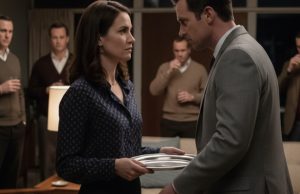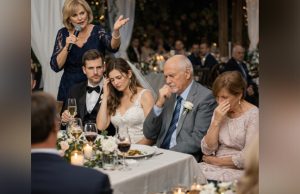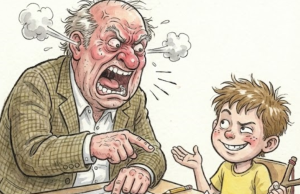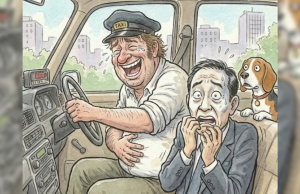
“Just take her and go—quickly…”
“But why me? What’s so special about me?”
Even after thirty years, those words remain etched in my memory. That one cold, gray evening in 1995 changed my life forever.
It was an especially grim winter. I stood at the bus stop, shivering and daydreaming about a hot cup of tea and the comfort of my favorite chair at home.
“Marina, waiting for the last bus again?” my neighbor Zinaida Petrovna called out.
“What else can I do?” I smiled. “No money for a taxi.”
As she walked away, I noticed a woman in a shabby coat nearby, holding a toddler. Our eyes met. I saw something in hers—fear, desperation, maybe both.

“Please hold her for a moment,” the woman said suddenly, pushing the child toward me. “I just need to run to the newsstand…”
Before I could react, I was holding a little girl. The woman vanished, leaving behind only a battered suitcase.
Five minutes passed. Then ten. Still no sign of her.
Back home, my husband Lyosha was furious. “We have to call the police! Who just leaves a child like that?”
We stared at the suitcase, afraid to open it.
Inside, we found stacks of cash and documents for Anna Sergeyevna Volkova, two years and two months old.

The next morning, Ani—yes, we started calling her that—woke up in our home, calm and trusting. It felt as if she had always been ours.
We made a decision. Quietly, we left Moscow and started over in the small village of Sosnovka. The house we bought was bigger than we needed, but it became our sanctuary.
That first winter was brutal. Lyosha worked in the forestry service while I learned how to heat the stove and keep a home running off the grid. Ani, curious and fearless, adjusted quickly. Nothing seemed to frighten her—not even when she jumped off the shed roof and scraped her knee.
She grew into a bright, thoughtful girl. Her teachers adored her, especially her biology teacher, who saw her potential early on.
At twelve, the questions began. Where did I come from? Why are there no baby pictures? She’d spend time in the attic, rummaging through trunks, searching for answers.
At sixteen, she fell for Vitya Prokhorov—the village troublemaker. Lyosha was livid. I said, “Let her find her own way.”

She did. Within weeks, Vitya softened. He helped around the house, read poetry, and taught Ani guitar. We didn’t interfere.
We never touched the money—except once.
When a fire destroyed a neighboring family’s home, we quietly used some to help them rebuild.
Ani worked hard, put herself through medical school, and refused any help from us. She lived in a dorm, juggled part-time jobs, and did internships at the local hospital. We watched her become the person she was always meant to be.
Years flew by. Our home aged, but it remained filled with warmth and quiet joy.
And now, thirty years later, Ani is coming home. I watch the golden leaves fall and feel something stir.

“Mom! Dad!” Her voice calls out. “Come greet the guests!”
She steps out of the car with her husband, Mikhail, and their two kids—Pasha, ten, and Masha, seven. Our quiet home is suddenly alive again with laughter and the sound of little feet.
“Ani,” I say, “help me bring something down from the attic?”
She lifts the old suitcase with curiosity. “What’s this? Your keepsakes?”
“No, darling,” I say. “It’s yours.”
And then I tell her. About that winter night, the woman at the bus stop, the fear we lived with, the joy we found, the decision that changed everything.
Ani listens without interrupting, her eyes full of emotion.
We were never bound by blood. But we were always bound by love.

They say family is built on shared roots—but ours grew from one unexpected moment of trust. A suitcase. A child. A second chance.
And that love—it’s as real as the clumsy bunny-shaped pancakes Ani used to make as a kid. A little uneven, a little silly—but warm, sweet, and completely ours.

















